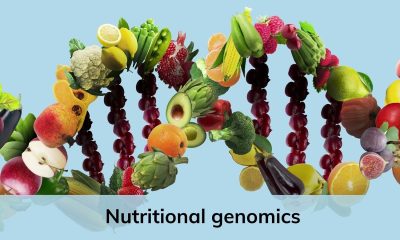health
The Future of Nutritional Supplements: Innovations & Research

The Future of Nutritional Supplements: Innovations and Research
In recent years, the landscape of nutritional supplements has evolved significantly, driven by a surge in consumer interest, scientific research, and technological advancements. As the global population becomes increasingly health-conscious, the demand for effective and innovative nutritional supplements continues to rise. This article explores the future of nutritional supplements, highlighting key innovations and research trends that are shaping the industry.
The Growing Importance of Nutritional Supplements
Nutritional supplements have become an integral part of modern health and wellness routines. They are designed to provide essential nutrients that may not be consumed in sufficient quantities through diet alone. These include vitamins, minerals, amino acids, enzymes, and other vital compounds. The primary goal of nutritional supplements is to support overall health, enhance physical performance, and prevent or manage various health conditions.
Innovations in Nutritional Supplements
1. Personalized Nutrition
One of the most promising trends in the future of nutritional supplements is personalized nutrition. Advances in genomics, microbiomics, and artificial intelligence (AI) are enabling the development of tailored supplement regimens based on an individual’s unique genetic makeup, lifestyle, and health status. Personalized nutrition aims to optimize health outcomes by addressing specific nutritional needs and reducing the risk of nutrient deficiencies.
For instance, companies are now offering DNA testing kits that analyze genetic variations related to nutrient metabolism. Based on the results, customized supplements are formulated to meet the individual’s specific requirements. This approach not only enhances the efficacy of supplements but also minimizes the risk of adverse effects.
2. Bioavailability Enhancement
Bioavailability refers to the proportion of a nutrient that is absorbed and utilized by the body. Traditional supplements often face challenges related to poor bioavailability, which can limit their effectiveness. To address this issue, researchers are exploring innovative delivery systems and formulations that enhance the bioavailability of nutrients.
Nanotechnology, for example, is being used to create nano-encapsulated supplements that improve the absorption and stability of nutrients. Liposomal delivery systems, which encapsulate nutrients within lipid vesicles, are also gaining popularity for their ability to enhance bioavailability. These advancements ensure that the body can efficiently absorb and utilize the nutrients provided by supplements.
3. Plant-Based and Sustainable Supplements
As environmental concerns and ethical considerations become more prominent, there is a growing demand for plant-based and sustainable nutritional supplements. Plant-based supplements are derived from natural sources such as fruits, vegetables, herbs, and algae. They are often rich in phytonutrients, antioxidants, and other bioactive compounds that offer a range of health benefits.
Moreover, sustainable practices in the production of supplements are gaining traction. This includes the use of renewable resources, eco-friendly packaging, and ethical sourcing of raw materials. Companies are increasingly adopting sustainable practices to reduce their environmental footprint and meet the expectations of environmentally conscious consumers.

Picture by: Dalle
Cutting-Edge Research in Nutritional Supplements
1. Microbiome and Gut Health
The human microbiome, particularly the gut microbiota, plays a crucial role in overall health and well-being. Research has shown that the gut microbiome influences various aspects of health, including digestion, immune function, and mental health. As a result, there is a growing interest in developing supplements that support gut health by modulating the microbiome.
Probiotics, prebiotics, and synbiotics are at the forefront of this research. Probiotics are live beneficial bacteria that can improve gut health, while prebiotics are non-digestible fibers that feed these beneficial bacteria. Synbiotics combine both probiotics and prebiotics to provide a synergistic effect. Ongoing research is exploring the potential of these supplements to prevent and manage conditions such as irritable bowel syndrome (IBS), inflammatory bowel disease (IBD), and even mental health disorders.
2. Cognitive Health and Nootropics
Cognitive health is another area where nutritional supplements are making significant strides. Nootropics, also known as “smart drugs” or cognitive enhancers, are supplements that aim to improve cognitive function, including memory, focus, and mental clarity. These supplements often contain ingredients such as omega-3 fatty acids, B vitamins, ginkgo biloba, and bacopa monnieri.
Recent research is delving into the potential of nootropics to support brain health and prevent cognitive decline associated with aging and neurodegenerative diseases. For example, studies have shown that omega-3 fatty acids, particularly DHA, play a vital role in brain health and may reduce the risk of Alzheimer’s disease. As the population ages, the demand for cognitive health supplements is expected to grow, driving further research and innovation in this field.
3. Immune Support
The COVID-19 pandemic has underscored the importance of a robust immune system. As a result, there has been a surge in interest in supplements that support immune health. Vitamins C and D, zinc, and elderberry are among the most popular ingredients used in immune-boosting supplements.
Emerging research is investigating the potential of other compounds, such as beta-glucans, medicinal mushrooms, and adaptogens, to enhance immune function. Beta-glucans, found in sources like oats and mushrooms, have been shown to modulate the immune system and improve its response to infections. Medicinal mushrooms, such as reishi and shiitake, contain bioactive compounds that may support immune health. Adaptogens, such as ashwagandha and rhodiola, help the body adapt to stress and may have immune-boosting properties.
The Role of Technology in the Future of Nutritional Supplements
Technological advancements are playing a pivotal role in shaping the future of nutritional supplements. From AI-driven personalized nutrition platforms to blockchain technology for supply chain transparency, technology is revolutionizing the industry.
AI and machine learning algorithms are being used to analyze vast amounts of data, including genetic information, dietary habits, and health metrics, to create personalized supplement recommendations. This data-driven approach ensures that individuals receive the most appropriate supplements for their unique needs.
Blockchain technology is enhancing transparency and traceability in the supplement industry. Consumers can now access detailed information about the sourcing, manufacturing, and quality control processes of their supplements. This transparency builds trust and ensures that consumers are getting high-quality products.
Conclusion
The future of nutritional supplements is bright, with innovations and research paving the way for more effective, personalized, and sustainable solutions. As scientific understanding of nutrition and health continues to evolve, so too will the nutritional supplement industry. Personalized nutrition, bioavailability enhancement, plant-based supplements, and cutting-edge research in gut health, cognitive health, and immune support are just a few of the exciting developments on the horizon.
With technology driving advancements and a growing emphasis on sustainability, the nutritional supplement industry is poised to meet the needs of health-conscious consumers in innovative and impactful ways. The future holds great promise for those seeking to optimize their health and well-being through the power of nutritional supplements.
Care
Prenatal Multivitamin Gummies: A Guide for Expecting Mothers

Pregnancy is a time of great change for expecting mothers. During these nine months, proper nutrition becomes more important than ever, as it supports both the health of the mother and the development of the baby.
While a balanced diet is essential, it can be difficult for many expecting moms to get all the nutrients they need through food alone.
This is where prenatal vitamins, especially prenatal multivitamin gummies, play a critical role. These chewable supplements provide an easy, convenient, and effective way for mothers to ensure they are getting the necessary nutrients.

Why Prenatal Multivitamin Are a Game Changer for Expecting Moms
Prenatal multivitamin gummies offer a number of benefits that make them an appealing option for pregnant women. Not only are they a tasty alternative to traditional pills, but they also provide essential vitamins and minerals that are critical during pregnancy.
1. Convenience and Ease of Consumption
For many women, swallowing large pills can be difficult, particularly during pregnancy when nausea and morning sickness are common. Prenatal multivitamin gummies offer a much more palatable and enjoyable alternative.
With a variety of flavors and the ease of chewing rather than swallowing pills, these gummies help ensure that moms-to-be are more likely to stay consistent with their supplementation.
Additionally, their compact size and convenience make it easy to incorporate into daily routines. Whether at home or on-the-go, prenatal gummies can be taken at any time, ensuring moms don’t miss out on vital nutrients.
2. Rich Source of Essential Nutrients
Prenatal multivitamin gummies are formulated to support the nutritional needs of pregnant women. These gummies typically include vital vitamins and minerals such as:
- Folic Acid: This B-vitamin is one of the most important for a healthy pregnancy. Folic acid helps prevent birth defects of the brain and spine and is essential for fetal development.
- Iron: Pregnant women are at a higher risk of anemia due to increased blood volume. Iron helps support the increased demand for oxygen-carrying red blood cells and aids in preventing iron-deficiency anemia.
- Calcium: This mineral is necessary for the development of the baby’s bones and teeth. It additionally aids in preserving the mother’s bone health throughout pregnancy.
- Vitamin D: Vitamin D supports the immune system and helps the body absorb calcium more efficiently, which is critical for both the mother and the baby.
- Iodine: Iodine is crucial for proper thyroid function and plays a key role in the baby’s brain development.
Many prenatal gummy supplements also include other beneficial nutrients such as Vitamin A, Vitamin C, and Zinc, all of which play a part in immune function, skin health, and overall wellness for both mom and baby.
3. Better Absorption and Less Risk of Stomach Upset
Unlike traditional prenatal pills, which can be tough on a sensitive stomach, prenatal multivitamin gummies are generally easier to digest and less likely to cause stomach upset.
Many pregnant women experience nausea, heartburn, or indigestion, especially during the first trimester. Gummies tend to be gentler on the digestive system, allowing moms to get the essential nutrients without the discomfort associated with pill form.
Moreover, since these vitamins are in a chewable form, they are absorbed more quickly into the bloodstream, leading to faster and potentially more efficient nutrient delivery to both mother and baby.
4. Improved Adherence to Prenatal Supplementation
One of the challenges many expecting mothers face is maintaining consistency with their prenatal supplementation. Studies have shown that when prenatal vitamins are in a more appealing form, like gummies, women are more likely to follow their supplementation schedule.
The tasty flavors make it easier for pregnant women to take their daily dose without forgetting or feeling overwhelmed by the process.
This consistent adherence helps ensure that both the mother and baby receive the required nutrients every day, supporting healthy growth and development throughout the pregnancy.
The Role of Prenatal Multivitamin Gummies in Supporting a Healthy Pregnancy
Prenatal multivitamin gummies play an essential role in filling nutritional gaps that may exist in the diet of an expecting mom. While a well-balanced diet should ideally provide all the necessary nutrients, pregnancy increases a woman’s nutritional requirements.
Often, women experience food aversions or cravings, making it difficult to maintain a balanced diet. These nutritional gaps can be addressed with the help of prenatal multivitamin gummies, ensuring that mom and baby have the vitamins and minerals they need.
Furthermore, supplements like prenatal vitamins have been shown to help reduce the risk of pregnancy complications, including preterm labor and low birth weight.
Consuming the right combination of nutrients during pregnancy also helps optimize fetal development, ensuring babies are born healthy and strong.
How Prenatal Multivitamin Gummies Help With Specific Pregnancy Symptoms
Pregnancy can bring with it a variety of symptoms, some of which can be mitigated with proper supplementation. Prenatal multivitamin gummies, with their specific formulation of vitamins and minerals, are designed to help with the following common pregnancy concerns:
- Morning Sickness: Prenatal gummies are typically easier on the stomach and less likely to induce nausea compared to traditional tablets. Vitamin B6, which is commonly found in these gummies, is known to help reduce nausea, making it a popular remedy for morning sickness.
- Fatigue: The increased iron content in prenatal multivitamin gummies can help combat fatigue caused by low iron levels. Iron is essential for producing red blood cells that carry oxygen to both the mother and baby, helping moms-to-be feel more energized.
- Immune Support: Pregnancy often weakens the immune system, and supplements like Vitamin C and Zinc found in prenatal multivitamins help bolster the immune system. These vitamins support the body in fighting off infections and maintaining overall health during pregnancy.
Are Prenatal Multivitamin Gummies as Effective as Traditional Pills?
Many expecting mothers may wonder whether prenatal gummies are as effective as traditional pill supplements. The answer largely depends on the specific formulation of the product.
While both forms of supplementation are effective, gummies tend to offer a slightly higher level of bioavailability, meaning that the body absorbs them faster and more efficiently.
However, it is important to choose a high-quality prenatal gummy that contains the right balance of nutrients. Not all gummy supplements are created equal, so it’s important to consult with a healthcare provider to ensure the product meets the specific nutritional needs of the mother and baby.
Conclusion
Prenatal multivitamin gummies are an excellent option for expecting mothers seeking a convenient, gentle, and effective way to support their pregnancy health.
With essential vitamins and minerals like folic acid, iron, calcium, and Vitamin D, these gummies provide a vital source of nutrients for both the mother and the developing baby.
They are particularly beneficial for women who may struggle with traditional prenatal pills or those who experience nausea during pregnancy.
By making it easier to stay consistent with supplementation, prenatal multivitamin gummies help ensure that the mother’s nutritional needs are met, supporting healthy fetal development and a smoother pregnancy journey.
For expecting mothers, choosing high-quality prenatal multivitamin gummies can truly make a difference in how they feel and how their pregnancy progresses, providing peace of mind and a healthier start for both mom and baby.
Care
Leukoplakia: Causes, Symptoms, and Treatment for Oral Health

White patches inside the mouth can be worrying, especially when they appear unexpectedly or refuse to go away. Among the most common causes of such patches is a condition known as leukopakia. While it is often harmless, leukoplakia can occasionally signal early signs of more serious problems, making awareness and early detection essential.
Understanding what leukoplakia looks like, why it develops, and how it is treated empowers individuals to take charge of their oral health. This guide walks you through the key facts, symptoms and treatment options, offering clarity and confidence for those who may be noticing unusual changes in their mouth.
What Is Leukopakia?
Leukoplakia refers to thickened white or grey patches that form inside the mouth due to excessive cell growth, often triggered by long-term irritation. These patches may appear on the gums, inner cheeks, tongue, or roof of the mouth. While many cases are harmless, some require monitoring to ensure no further complications develop. Early detection is important because changes can sometimes indicate underlying issues.
Types of leukoplakia:
- Ordinary leukoplakia: Commonly linked to tobacco use and continual irritation.
- Hairy leukoplakia: Associated with viral infections and seen more frequently in individuals with weakened immune systems.
Identifying leukoplakia early helps ensure abnormalities are evaluated promptly and managed before they progress.

What Do Leukoplakia Patches Look Like?
Leukoplakia patches usually appear as uneven, slightly raised areas that feel rough and range in color from white to grey. They cannot be scraped off, which helps distinguish them from conditions like oral thrush. Although generally painless, some people may notice mild sensitivity or irritation, especially when consuming hot or spicy foods. Sudden changes in appearance should be taken seriously.
Warning signs that require urgent evaluation:
- Patches turning red or darkening
- Rapid growth in size
- Increasing discomfort or sensitivity
These changes are often first spotted during brushing or routine dental visits, highlighting the importance of regular check-ups with a dentist or a hygienist in Chichester.
Common Causes & Risk Factors
Leukopakia can be triggered by several factors. Some of the most common include:
Lifestyle-related causes
- Tobacco use: Smoking or chewing tobacco remains the most significant cause, responsible for the majority of diagnosed cases.
- Excessive alcohol consumption: Alcohol irritates the oral tissues and magnifies the effects of smoking when combined.
Irritation-related causes
- Rough or sharp teeth rubbing against the inside of the mouth
- Poorly fitted dentures
- Chronic cheek or tongue biting
Medical and biological factors
- Viral infections such as Epstein–Barr virus
- Weakened immune systems
- Ageing and prolonged exposure to irritants
In some instances, individuals discover leukoplakia when visiting an emergency dentist in Chichester due to pain, bleeding or sudden irritation, even though these signs are not always directly caused by the patches themselves.
Diagnosis: How Professionals Identify Leukoplakia
Diagnosing leukoplakia usually starts with a clinical examination, where a dental professional assesses the affected area, reviews medical history, and asks about habits such as smoking or alcohol use. If a patch persists for more than two weeks, further investigation is required to determine the cause. A biopsy is commonly recommended to rule out precancerous changes, involving the removal of a small tissue sample for laboratory analysis. This quick, straightforward procedure helps identify whether the cells show signs of concern.
Additional diagnostic steps may include:
- Extra testing for hairy leukoplakia, especially if a viral condition is suspected
- Imaging or specialist assessment when needed
- Close monitoring of changes in size, texture, or color
Early diagnosis ensures that any potentially harmful developments are addressed promptly. Routine check-ups with a dental professional or a hygienist in Chichester also support long-term monitoring and early detection of new or evolving patches.
Treatment Options
1. Lifestyle and Habit Changes
The first step in managing leukoplakia often involves removing the source of irritation. This may include:
- Stopping smoking or chewing tobacco
- Reducing alcohol intake
- Improving daily oral hygiene practices
For many people, simply eliminating the irritant leads to noticeable improvement or complete resolution of the patches.
2. Dental and Medical Interventions
If leukoplakia is caused by irritation from a sharp tooth or poorly fitting denture, adjustments or replacements may be needed. Hairy leukoplakia may require medication, especially when linked to viral or immune issues. Sudden discomfort, bleeding, or rapid changes should prompt a visit to an emergency dentist in Chichester.
3. Surgical Treatments
If a biopsy reveals dysplasia or if the patches become particularly large or concerning, removal may be recommended. This can be done through:
- Laser therapy
- Cryotherapy (freezing the tissue)
- Traditional surgical excision
These procedures are typically quick and carried out under local anaesthesia, offering reassurance and protection against further risk.
Can Leukoplakia Turn Into Cancer?
Although most cases of leukoplakia remain harmless, a small number can develop into oral cancer over time. Factors that increase this risk include:
- Red patches mixed with white (erythroplakia)
- Rapid growth of the patch
- Persistent soreness or pain
- A long history of smoking and drinking
This is why regular monitoring is essential. With professional guidance and periodic check-ups, any suspicious changes can be caught early, significantly reducing long-term risk.
Prevention Tips
Good oral health habits are key to lowering your risk of developing leukoplakia. Consider the following preventive strategies:
| Preventive Action | Benefit |
| Quit smoking/tobacco | Reduces irritation and cancer risk |
| Limit alcohol use | Protects oral tissues |
| Address dental issues promptly | Prevents chronic friction |
| Maintain strong oral hygiene | Promotes healthier tissue |
| Attend regular dental check-ups | Ensures early detection |
A balanced diet, hydration and regular cleanings can further help maintain healthy oral tissues and reduce irritation.
When to See a Dental Professional
You should seek professional advice if:
- A white or grey patch lasts longer than two weeks
- There is persistent pain, discomfort or bleeding
- The patch changes shape, size or color
- You are a long-term smoker or drinker and notice new symptoms
Early assessment ensures greater peace of mind and more effective treatment options.
Conclusion
Leukoplakia may be a common condition, but paying attention to changes in your oral health is crucial. While most cases remain harmless, staying aware of symptoms, eliminating risk factors and seeking timely professional advice can significantly reduce complications. With the support of experienced dental professionals and proactive habits, you can maintain long-term oral health and confidence. For reliable care and regular check-ups, you can always count on Chichester to guide you toward better oral health and peace of mind.
Care
Enhance Your Career with the OSHA Industrial Safety Course

Introduction
Safety at work is a need in the contemporary industrial and construction industries which are experiencing rapid expansion. The manufacturing sectors also require skilled workers who are conversant with the international safety measures as well as preventing accidents before they occur. This is whereby the OSHA Industrial Safety Course in Rawalpindi comes in.
United College of Technology is pleased to provide a single and career oriented OSHA course in Rawalpindi that is intended to incorporate the current industry demand and global safety measures. This course is best suited to students, individuals, and organizations that would wish to enhance workplace safety and compliance.
What Is OSHA and Why Is It Important?
OSHA is an acronym of Occupational Safety and Health Administration, which is an internationally acclaimed author that establishes the safety standards in the places of work. OSHA guidelines have been used to minimize workplace hazards, injuries, and in favor of a robust safety culture in industries like:
- Construction
- Manufacturing
- Oil & Gas
- Engineering
- Power Plants
- Factories and Warehouses
Students can obtain real knowledge about rules of industrial safety which are recognized in the world by attending an OSHA course in Rawalpindi.

OSHA Industrial Safety Course in Rawalpindi – Course Overview.
United College of Technology provides the OSHA Industrial Safety Course in Rawalpindi that concentrates on the practical aspects of safety concerns in an industrial setting. The course involves both theoretical and practical studies to make sure that everything is understood.
Key Learning Areas Include:
- Detection of hazards in industries.
- Risk evaluation and management.
- The prevention of accidents at work.
- Safety signs and symbols
- Personal Protective Equipment (PPE).
- Fire and emergency response.
- Safety of electricity and mechanical.
- Standards of health and environmental safety.
The course is an OSHA in Rawalpindi course which is appropriate to both the novice and the already established professionals in need of certification regarding safety.
Why United College of Technology to take OSHA Course in Rawalpindi?
The selection of the appropriate institute is of important concern to quality education and progress of career. United College of technology is among the most reputable technical colleges that provide professional courses in terms of safety in the city of Rawalpindi.
The advantages of studying at United College of Technology are as follows:
- Well trained, professional teachers.
- Industry-relevant curriculum
- On-the-job training model.
- Affordable course fees
- Recognized OSHA certification.
- Career guidance and support
We would like to have qualified safety professionals who are capable of fulfilling both local and international industry requirements.
Career Scope Following OSHA Industrial Safety Course.
On finishing the OSHA Industrial Safety Course in Rawalpindi, students have an opportunity to take different jobs in the sphere of safety in Pakistan and other countries.
Career Opportunities It includes:
- Safety Officer
- Supervisor of industrial safety.
- HSE Officer
- Site Safety Inspector
- Safety Coordinator
- Health and Safety Manager (experienced).
The OSHA-certified professionals are in high demand particularly in the construction work, factories, and multinational enterprises.
Who Can enroll in OSHA Course in Rawalpindi?
The course is an OSHA program in Rawalpindi that is accessible to a large group of learners, and they include:
- Fresh students
- Diploma holders
- Engineers
- Site supervisors
- Technicians
- Factory workers
- Safety professionals
There is no higher education level needed and this is why it is easy to use and accessible to any person interested in workplace safety.
Experiential Training and Industry-Based Learning.
We are of the opinion that theory is not as valuable as practice is at United College of Technology. The OSHA Industrial Safety Course of Rawalpindi has real life case studies, safety drills and analysis of hazards to equip the students with the real work conditions.
Such practical method enables students to be able to use safety regulations with a lot of confidence in their job sites and industrial workplaces.
The importance of OSHA Certification in Pakistan and Europe.
The employers nowadays are attracted to the candidates who have professional safety certification. An OSHA course in Rawalpindi is not only one that is going to enhance your knowledge of safety but also improve your CV and employment opportunities.
The certification of OSHA demonstrates that you:
- Know the international standards of safety.
- Can reduce workplace risks
- Trained to deal with emergencies.
- Appreciate health and safety compliance.
- That would make you a valuable investment in any company.
Conclusion
The industrial Safety Course provided by the OSHA in Rawalpindi by United College of Technology is a good chance to have a good career in industrial and workplace safety. As more industry expands, the need to have professional safety workers is more than ever.
Studying this OSHA course in Rawalpindi you obtain internationally accepted knowledge, practical skills and get better employment opportunities not only in Pakistan but also in the abroad. United College of Technology is the place to begin in case you are serious about safety, professionalism and career development.
-
Business3 years ago
Cybersecurity Consulting Company SequelNet Provides Critical IT Support Services to Medical Billing Firm, Medical Optimum
-
Business3 years ago
Team Communication Software Transforms Operations at Finance Innovate
-
Business3 years ago
Project Management Tool Transforms Long Island Business
-
Business2 years ago
How Alleviate Poverty Utilized IPPBX’s All-in-One Solution to Transform Lives in New York City
-
health3 years ago
Breast Cancer: The Imperative Role of Mammograms in Screening and Early Detection
-
Sports3 years ago
Unstoppable Collaboration: D.C.’s Citi Open and Silicon Valley Classic Unite to Propel Women’s Tennis to New Heights
-
Art /Entertainment3 years ago
Embracing Renewal: Sizdabedar Celebrations Unite Iranians in New York’s Eisenhower Park
-
Finance3 years ago
The Benefits of Starting a Side Hustle for Financial Freedom










































